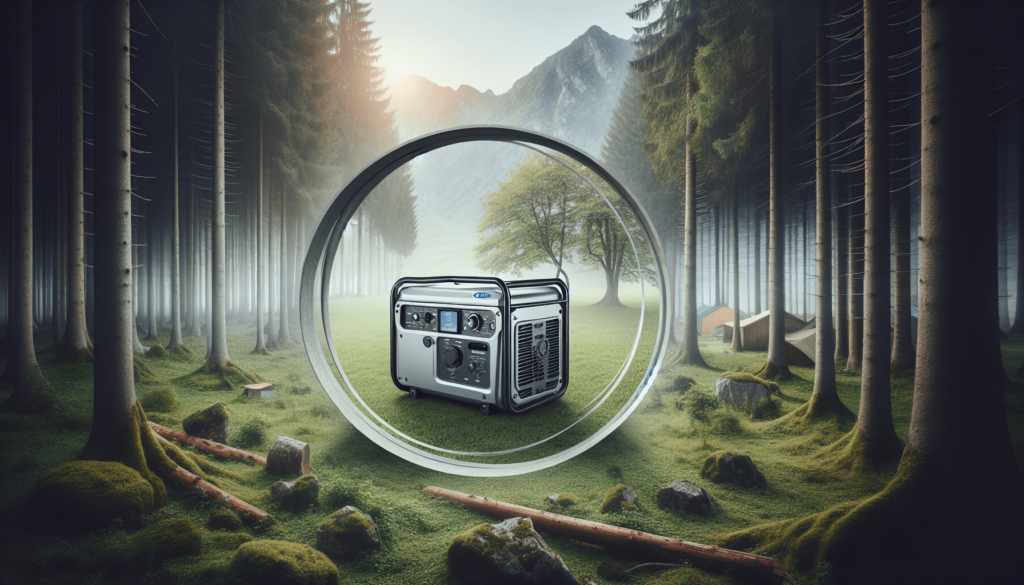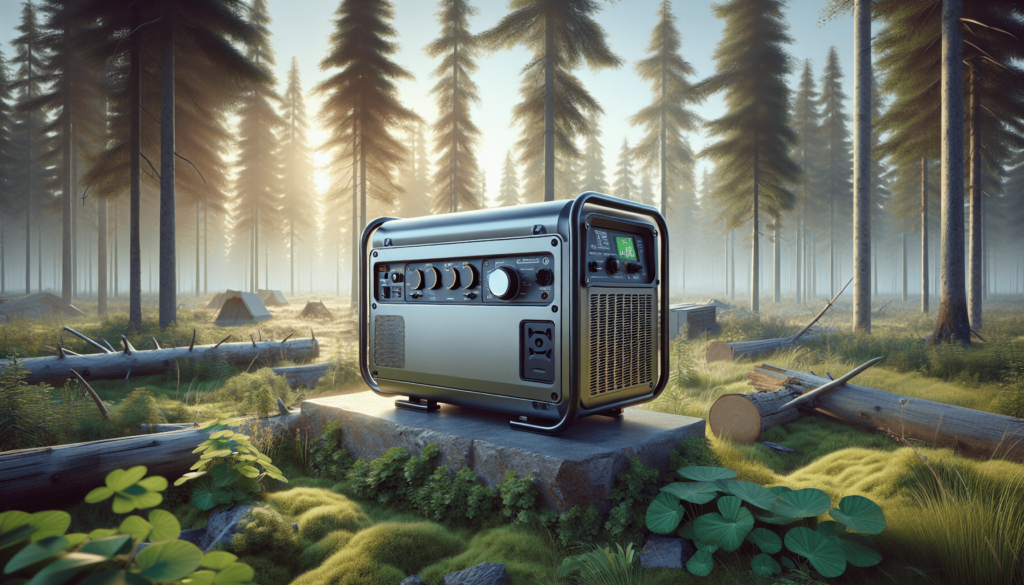
Ever found yourself wondering how to achieve true energy independence, especially when you’re far from the conveniences of urban life? It’s not an uncommon dream to have, particularly in today’s world where sustainability and self-reliance are becoming increasingly important. One could argue that the ultimate off-grid generator is a key component in making that dream a reality. So, what makes one generator more “ultimate” than another?

Understanding Your Energy Needs
Before you dive into the types of generators, it’s important to understand your specific energy needs. Different applications require different amounts of power, and knowing your requirements can dramatically influence your choice.
Estimating Your Power Consumption
Begin by estimating the total power consumption of the devices and appliances you plan to run. This can be calculated in watts.
| Appliance/Device | Power Rating (Watts) | Quantity | Total Consumption (Watts) |
|---|---|---|---|
| Refrigerator | 800 | 1 | 800 |
| LED Lighting | 10 | 15 | 150 |
| Laptop | 60 | 2 | 120 |
| Water Pump | 500 | 1 | 500 |
| Microwave | 1000 | 1 | 1000 |
| Total Consumption | 2570 |
By adding up the consumption of each device, you can get a solid idea of the minimum capacity your generator should handle.
Peak vs. Continuous Power
It’s crucial to consider both peak and continuous power requirements. Some devices might require a higher startup power (peak power) but run on lower power (continuous power). Ensure that the generator can handle these peaks without overloading.
Types of Off-grid Generators
Not all generators are created equal, and knowing the various types available can guide you toward the right choice.
Solar Generators
Solar generators are a popular and sustainable option. They convert sunlight into electrical energy via solar panels.
Advantages
- Renewable Energy Source: Solar panels rely on sunlight, which is a renewable resource.
- Low Operating Costs: Once installed, the operating cost is minimal.
- Eco-Friendly: Reduced carbon footprint compared to conventional fuel generators.
Disadvantages
- High Initial Cost: Solar panels and batteries can be expensive to purchase and install.
- Weather Dependent: Their efficiency is weather and location-dependent.
- Energy Storage Needs: Requires batteries for energy storage, which can add to the cost.
Wind Turbine Generators
Harnessing wind energy, these generators convert wind power into electrical energy. They work best in areas with consistent wind speeds.
Advantages
- Renewable: Uses wind, a renewable resource.
- No Fuel Costs: Once installed, there’s no fuel required.
- Scalability: Can be scaled up or down easily.
Disadvantages
- Initial Investment: High upfront costs for equipment and installation.
- Noise: Can generate noise, which might be a concern in residential areas.
- Space Requirements: Requires significant space and a location with adequate wind.
Diesel Generators
Diesel generators are a tried-and-true method for off-grid power, using diesel fuel to generate electricity.
Advantages
- Reliability: Known for their dependability and long lifespan.
- High Efficiency: Diesel engines are more fuel-efficient than their gasoline counterparts.
- Durability: Built to withstand rough conditions and extensive use.
Disadvantages
- Fuel Costs: Requires ongoing fuel purchases.
- Maintenance: Higher maintenance requirements to keep the engine running smoothly.
- Noise and Emissions: Typically noisy and emit pollutants.
Propane Generators
Propane generators are another viable option, using propane as their fuel source.
Advantages
- Clean Burning: Produces fewer emissions compared to gasoline and diesel.
- Fuel Storage: Propane can be stored for longer periods without degrading.
- Less Maintenance: Generally requires less maintenance.
Disadvantages
- Fuel Costs: Propane can be expensive, depending on your location.
- Storage Requirements: Needs safe and adequate storage for propane tanks.
- Lower Efficiency: Typically less fuel-efficient than diesel generators.
Hybrid Generators
Combining solar panels, wind turbines, and conventional fuel generators, hybrid systems aim to provide a more reliable off-grid power solution.
Advantages
- Reliability: Combines the strengths of multiple power sources to ensure a continuous supply.
- Flexibility: Can be configured based on your specific needs and conditions.
- Lower Fuel Dependence: Reduces the dependency on fuel by integrating renewable sources.
Disadvantages
- Complexity: More complicated to install and manage.
- Cost: Higher initial investment due to the integration of multiple technologies.
Key Features to Consider
When choosing the ultimate off-grid generator, several features can significantly impact its effectiveness and suitability for your needs.
Power Output
The power output is the primary feature to consider. Ensure the generator meets your peak and continuous power requirements. For instance, if your total estimated consumption is around 3,000 watts with potential peaks up to 5,000 watts, your generator should comfortably handle these figures.
Fuel Efficiency
Fuel efficiency is another critical factor, especially for conventional fuel generators. Greater fuel efficiency means lower running costs and less frequent fuel replenishment.
Portability
Depending on your specific needs, portability might be a factor. Some generators are designed to be easily transported, which is useful for applications like camping or temporary off-grid setups.
Noise Levels
Noise levels can be an essential consideration, particularly in residential areas or places where noise pollution is undesirable. Look for generators specifically designed to operate quietly.
Maintenance Requirements
Generators with lower maintenance requirements can save you time and money over the long run. Examine the manufacturer’s guidelines on the frequency and complexity of required maintenance.
Ease of Use
An intuitive and user-friendly interface can make managing your off-grid power a simpler task. Look for generators with straightforward controls and clear instructions.
Long-term Sustainability
While immediate energy needs are crucial, long-term sustainability is equally important. Consider solutions that offer not just resilience, but sustainability in the face of evolving environmental and personal conditions.
Battery Storage
Integrating a battery storage system can address the intermittency of renewable energy sources like solar and wind. Batteries store excess power generated during sunny or windy conditions for use during periods when the sun isn’t shining or the wind isn’t blowing.
Energy Management Systems
Advanced energy management systems optimize the efficiency of your off-grid setup by intelligently managing the power flow between different sources and storage to minimize waste and maximize uptime.
Routine Checks and Upgrades
Even the best systems require periodic checks and upgrades to stay in top shape. Stay informed about any updates or improvements that could enhance your generator’s performance and longevity.

Cost Considerations
Ultimately, the cost is a crucial determinant of what constitutes the “ultimate” off-grid generator for you. It’s not just about the upfront price but also the total cost of ownership over time.
Upfront Costs
The initial costs include the purchase of the generator, additional equipment like solar panels or batteries, and installation.
| Expense Component | Cost Range |
|---|---|
| Generator Purchase | $500 – $10,000+ |
| Solar Panels (Optional) | $200 – $1,000+ per panel |
| Wind Turbine (Optional) | $300 – $7,000+ |
| Installation | $500 – $5,000+ |
Running Costs
Running costs encompass fuel (for fuel-based generators), maintenance, and possible component replacements over time.
Financing Options
Given the high upfront costs, exploring financing options can make the investment more manageable. Look for potential grants, subsidies, or low-interest loans aimed at promoting renewable energy solutions.
Real-world Use Cases
To offer more context, let’s look at some real-world scenarios where the ultimate off-grid generator can make a difference.
Remote Cabins
For remote cabins, a combination of solar panels, a wind turbine, and a propane generator might offer a balanced and reliable power solution. Adequate battery storage ensures that you have power even during periods of low sunlight and wind.
Emergency Backup
In emergency situations, a diesel or propane generator shines due to its reliability and high power output. Pair it with a smaller solar setup to reduce fuel dependency and ensure some level of power even when fuel supplies are constrained.
Recreational Vehicles (RVs)
For RVs, portability and low noise levels are crucial. A portable gasoline generator combined with solar panels can provide an effective solution that balances power needs and convenience.
Sustainable Living
For those committed to sustainable living, a hybrid generator setup integrating both solar panels and wind turbines with substantial battery storage can offer a long-term, eco-friendly solution. This can be paired with smart home systems to manage power efficiency better.
Future Trends in Off-grid Generators
With the rapid advancement of technology, the landscape of off-grid power solutions continues to evolve. Keeping an eye on emerging trends can help you make an informed decision.
Integrating Smart Technology
The integration of IoT (Internet of Things) devices and smart technology is making off-grid generators more efficient. These systems can offer real-time performance metrics, remote monitoring, and even automated maintenance alerts to streamline management.
Improved Energy Storage Solutions
Developments in battery technology, such as solid-state batteries, promise longer lifespans, higher capacity, and faster charging times, making them an attractive option for off-grid power systems.
Renewable Energy Innovations
Innovations in renewable energy, including solar cells with higher efficiency rates and more effective wind turbines, can further reduce dependency on conventional fuel sources.
Government Incentives
Governments worldwide are increasingly offering incentives to promote the adoption of renewable energy solutions. Stay updated on any new subsidies, rebates, or tax incentives that can reduce the initial investment barrier for setting up your off-grid generator.
Conclusion
Determining the ultimate off-grid generator is a multifaceted task that depends on various factors, including your specific energy needs, environmental conditions, and long-term sustainability goals. A mix of renewable energy sources, efficient storage solutions, and reliable backup systems often works best.
Understanding your power consumption, examining different types of generators, considering key features, and keeping an eye on future trends are crucial steps in making an informed decision. Balancing immediate needs with long-term sustainability and cost considerations will guide you toward the most suitable off-grid generator for your unique situation.
Whether you’re powering a remote cabin, preparing for emergencies, enhancing your RV experience, or committing to a sustainable lifestyle, the ultimate off-grid generator is within your reach, equipped with the knowledge to make the right choice.
